Charles E W Bean, Diaries, AWM38 3DRL 606/7/1 - May 1915 - Part 3
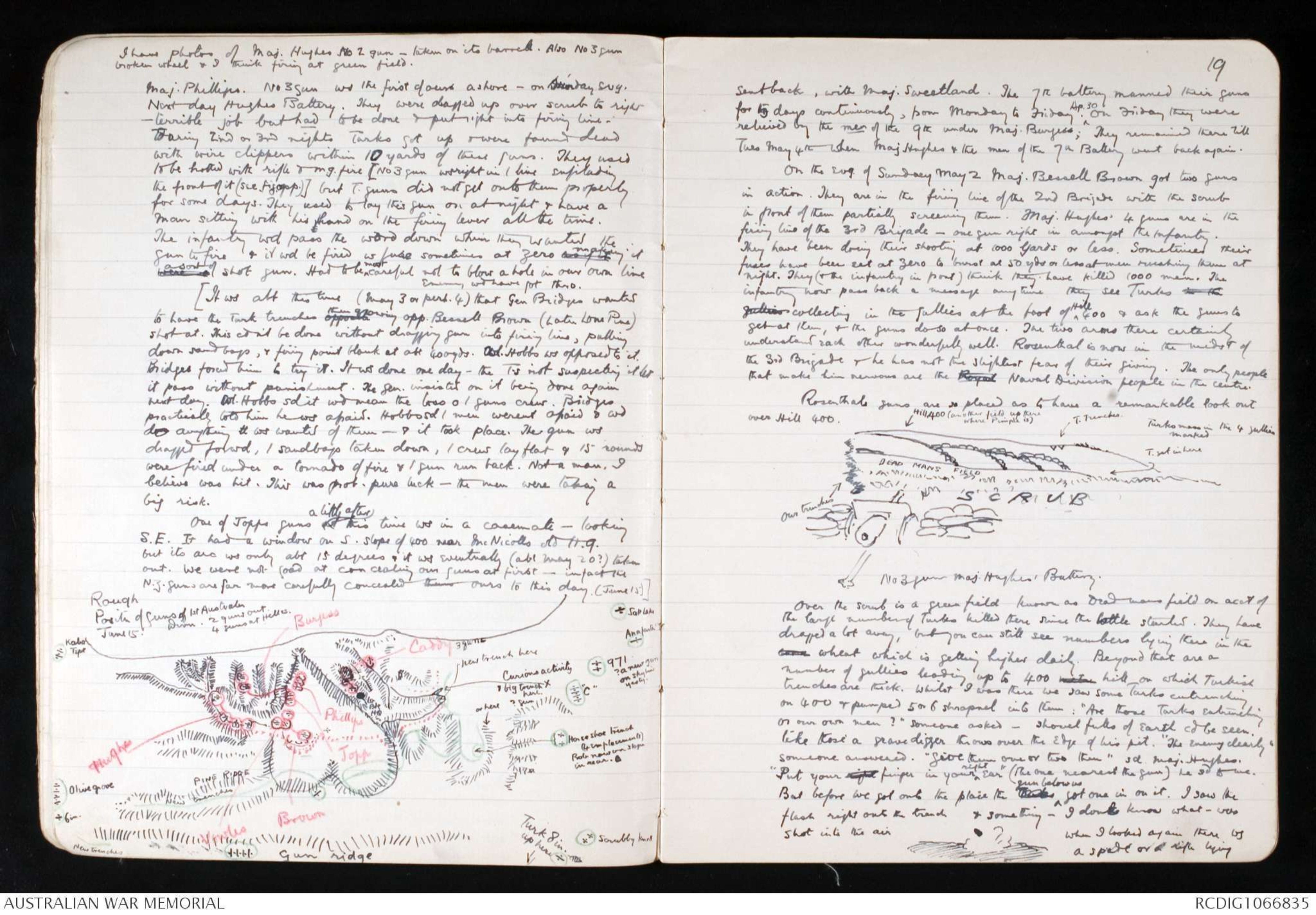
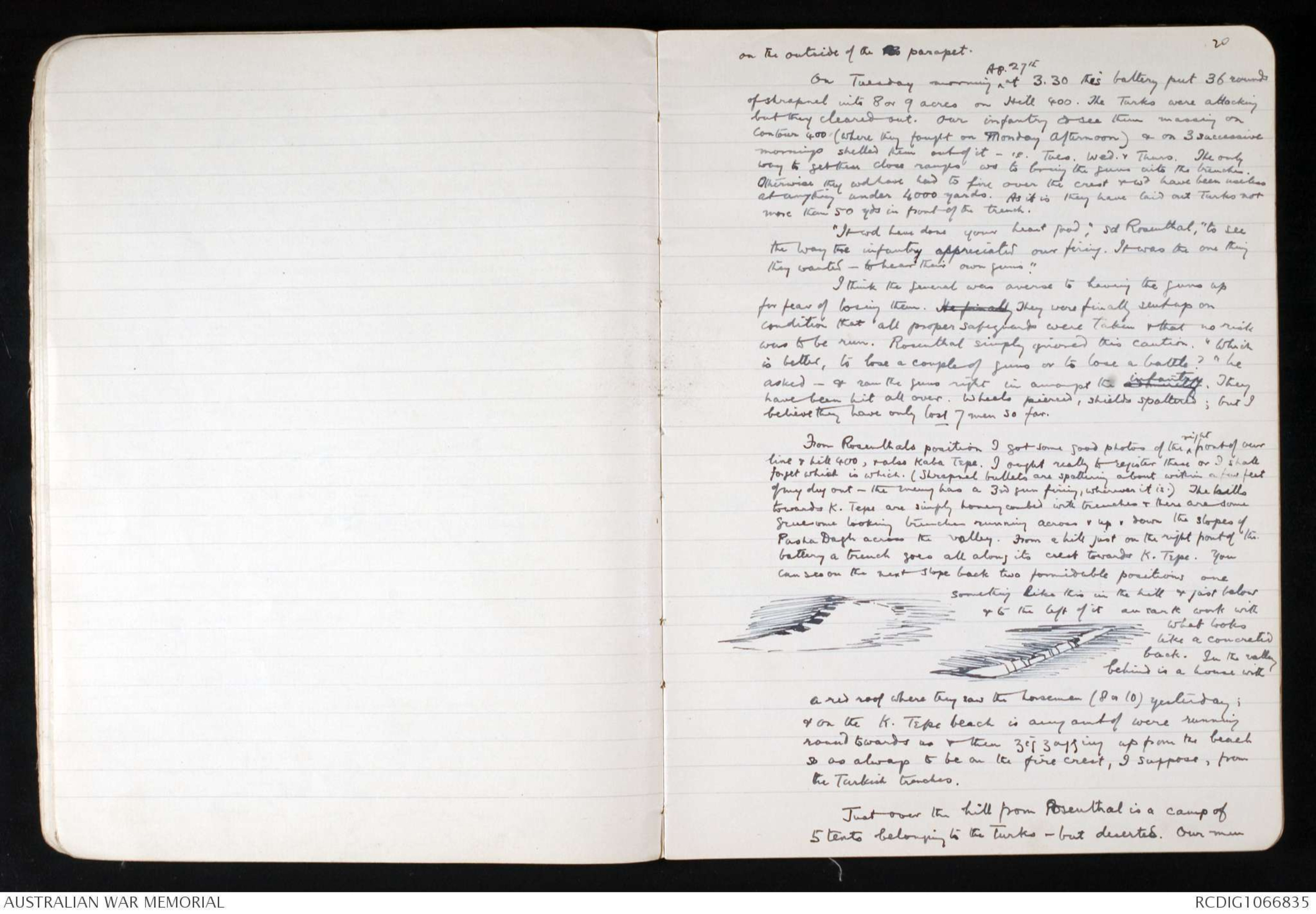
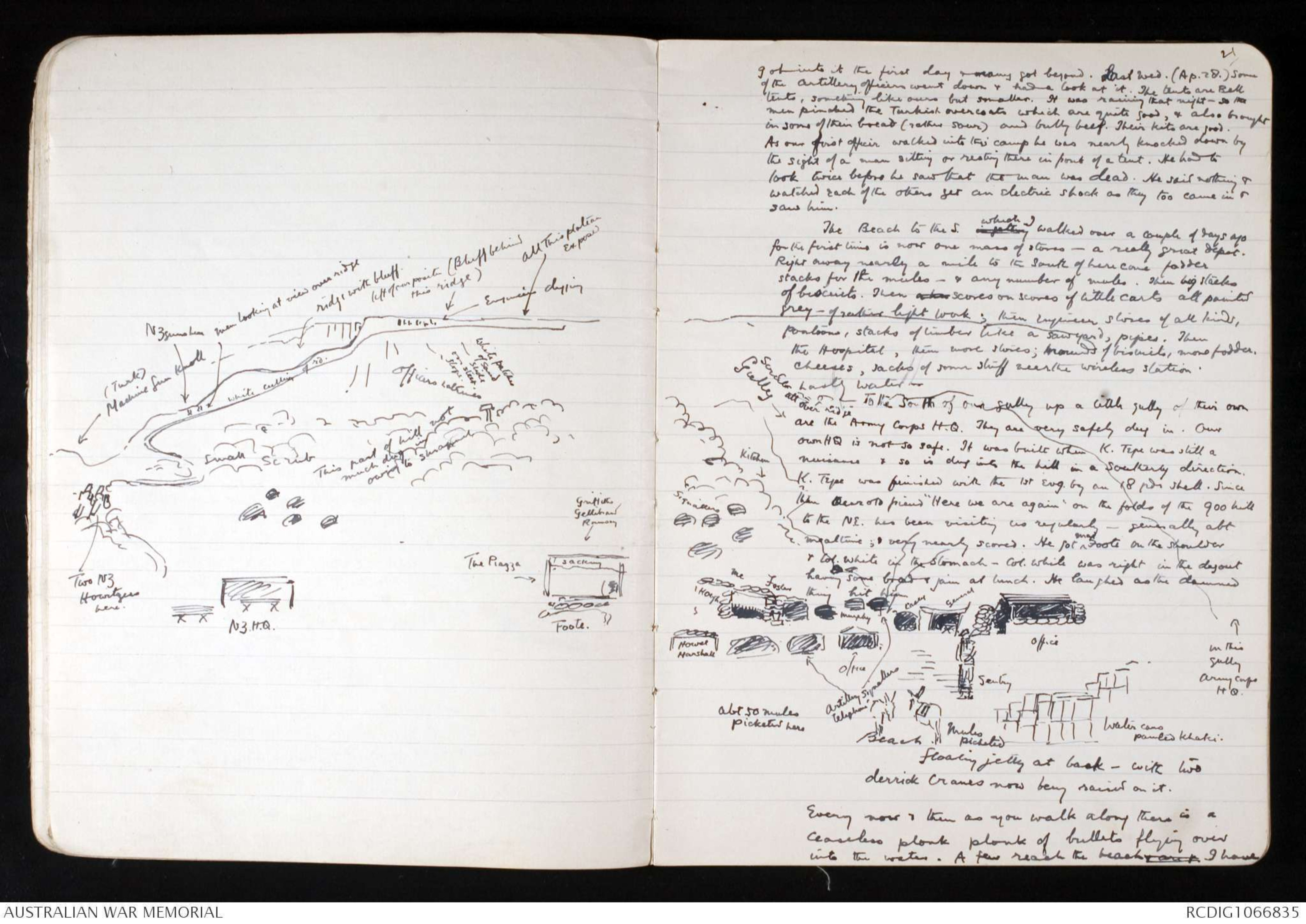
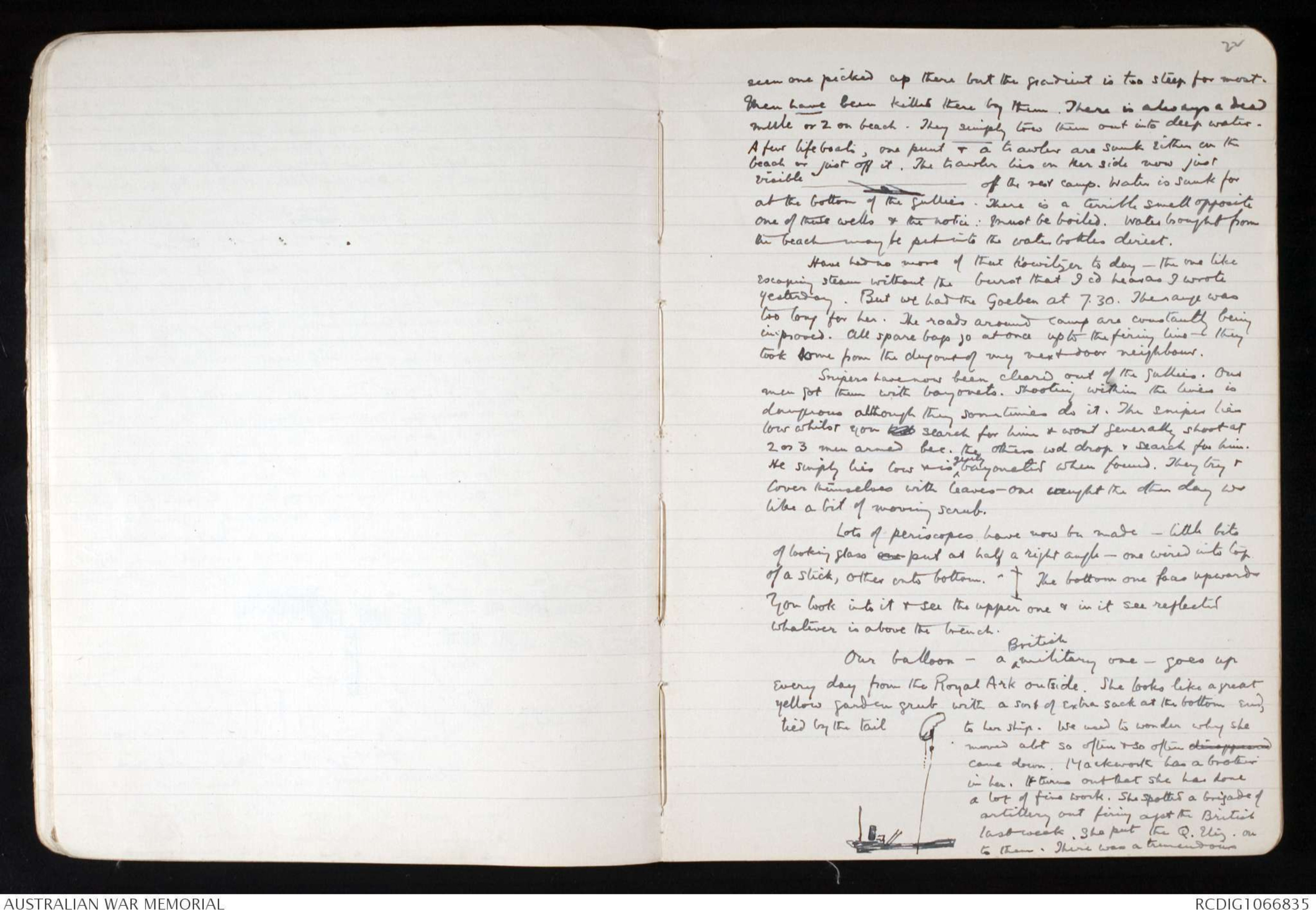
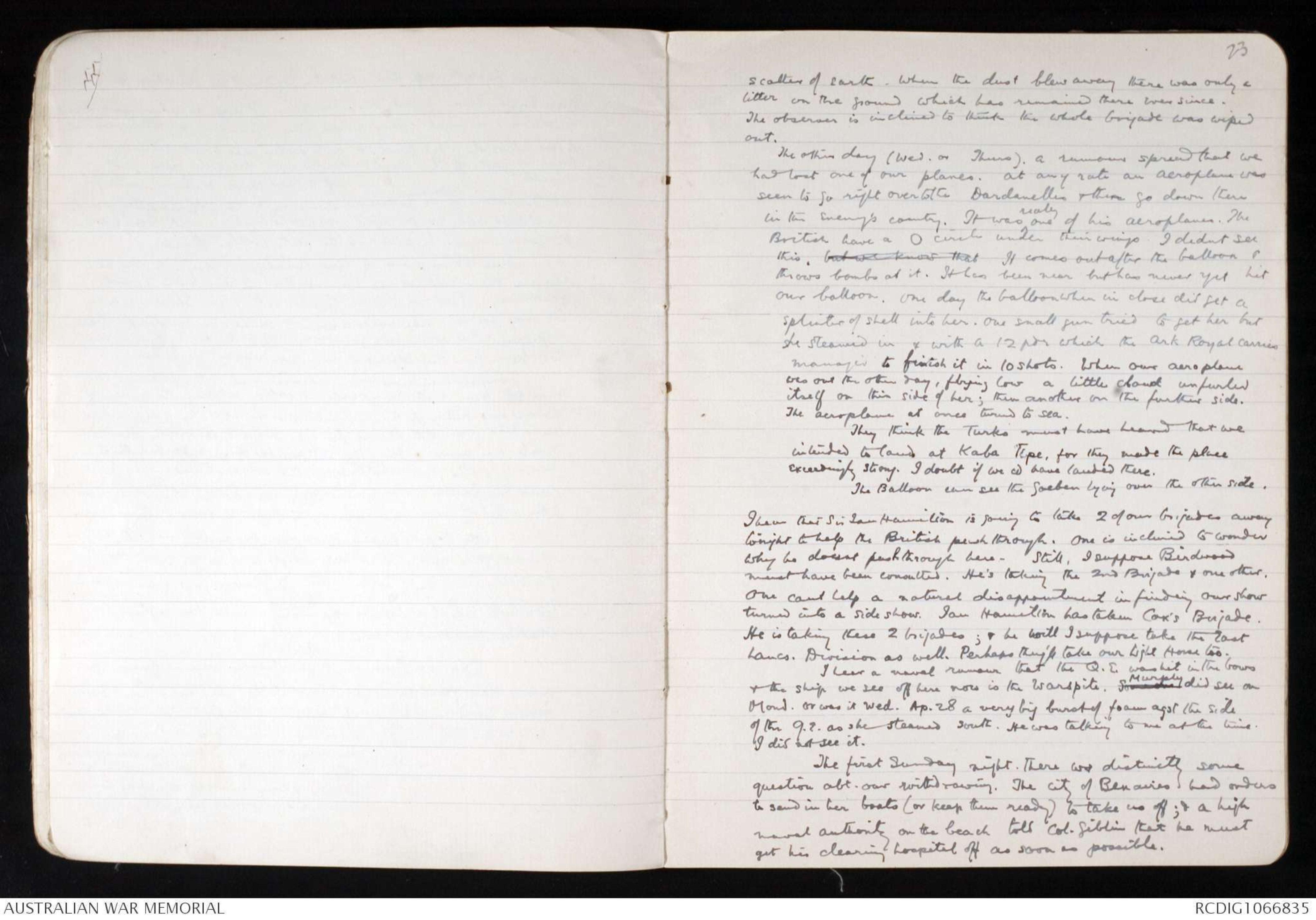
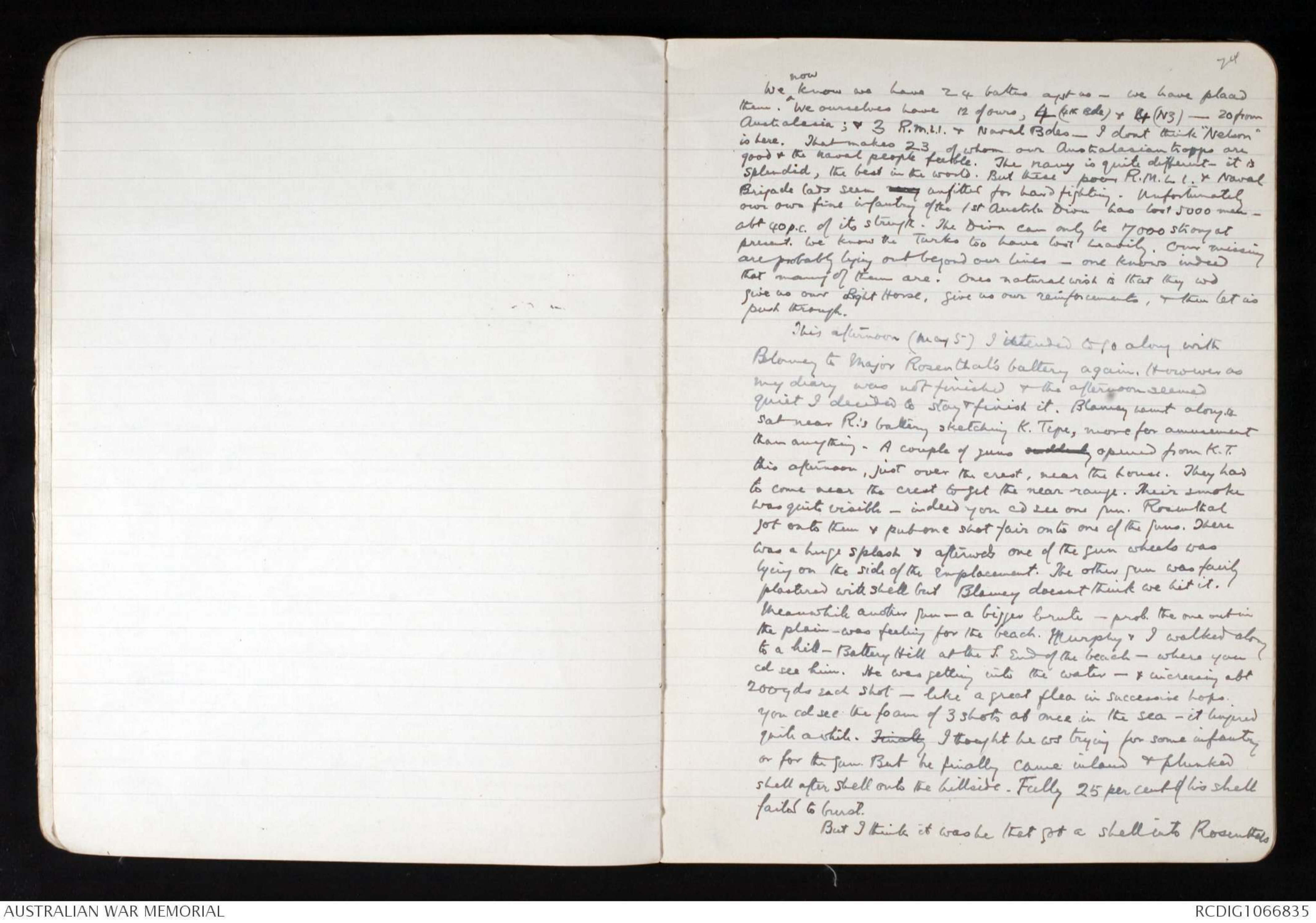
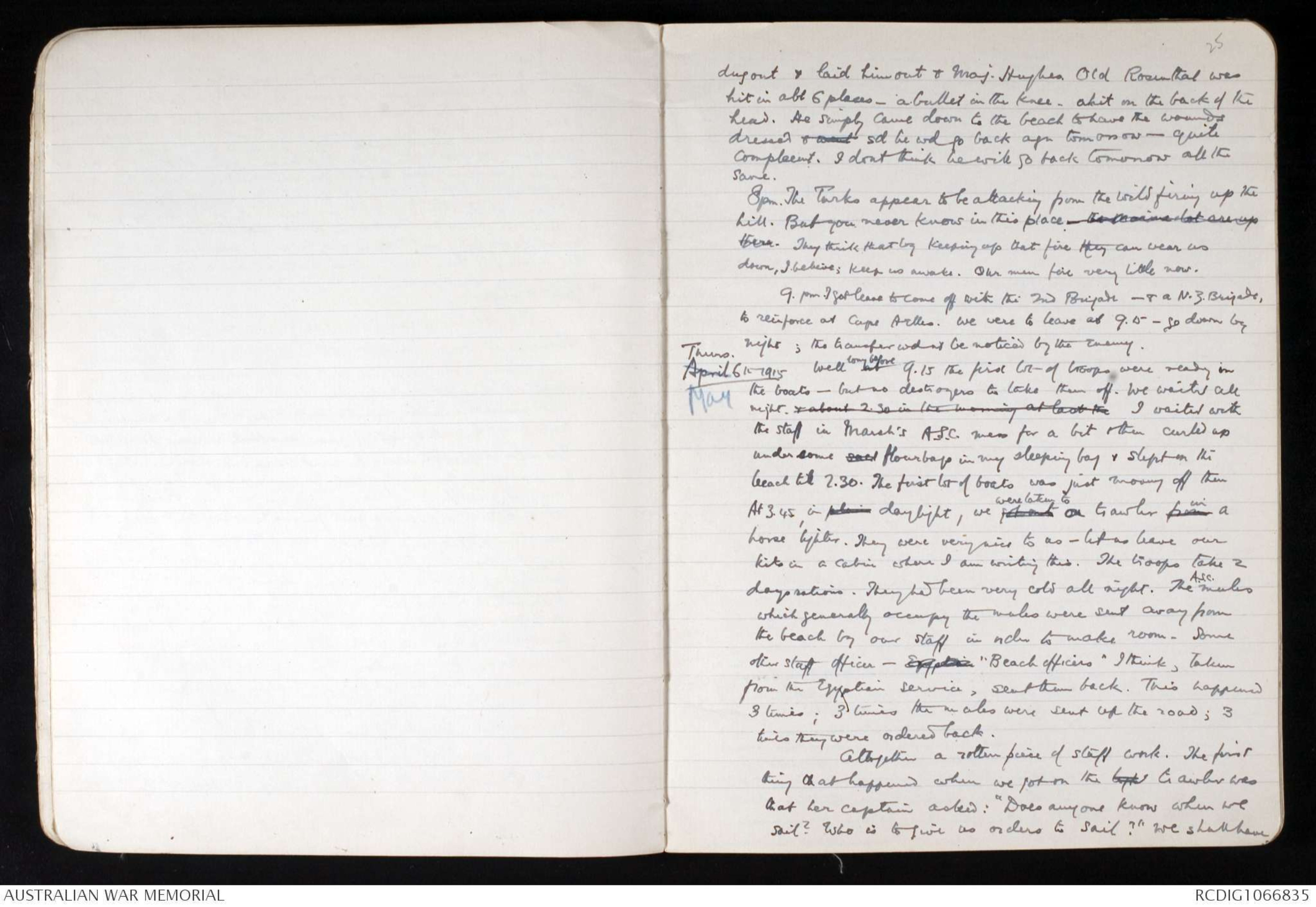
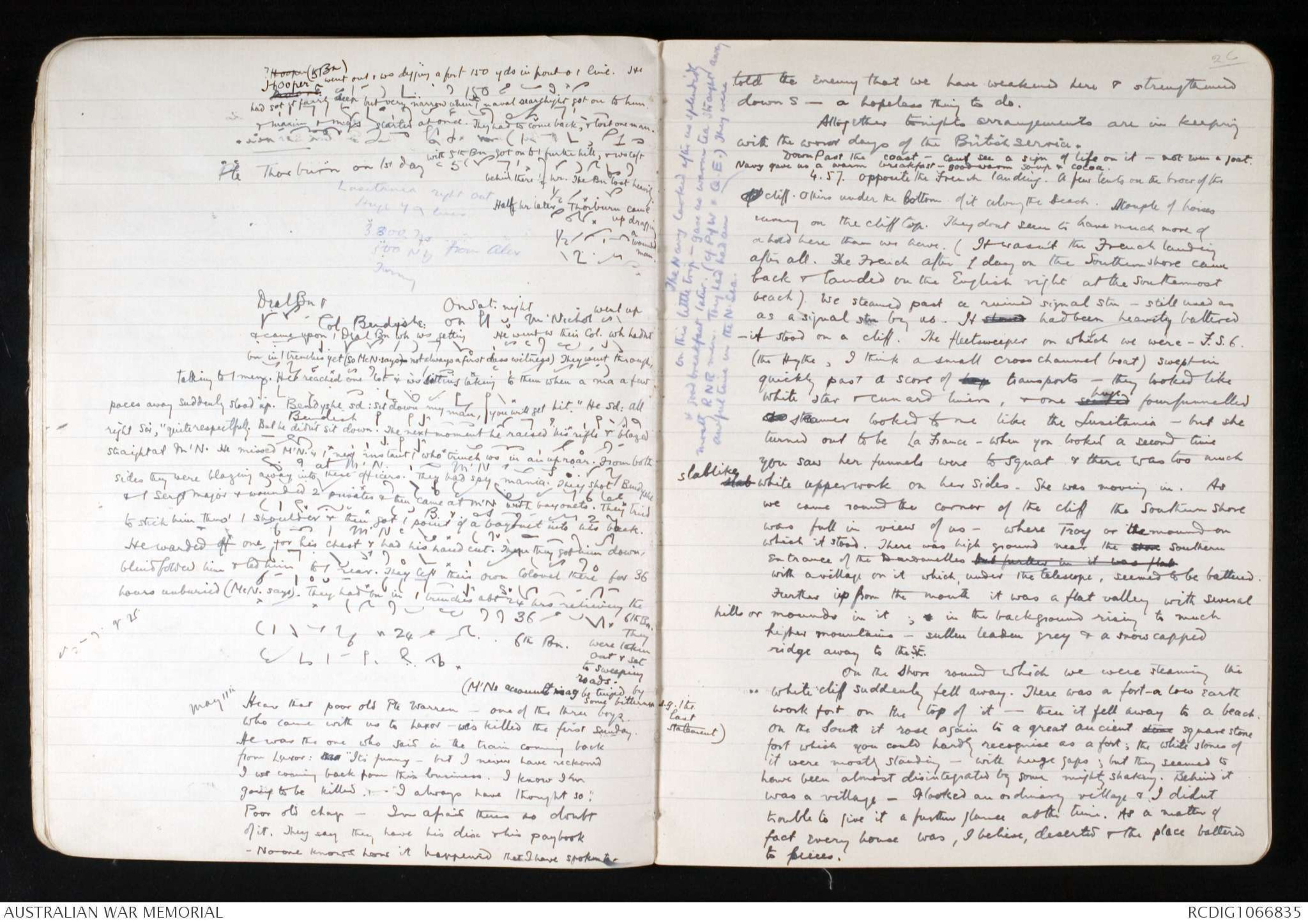
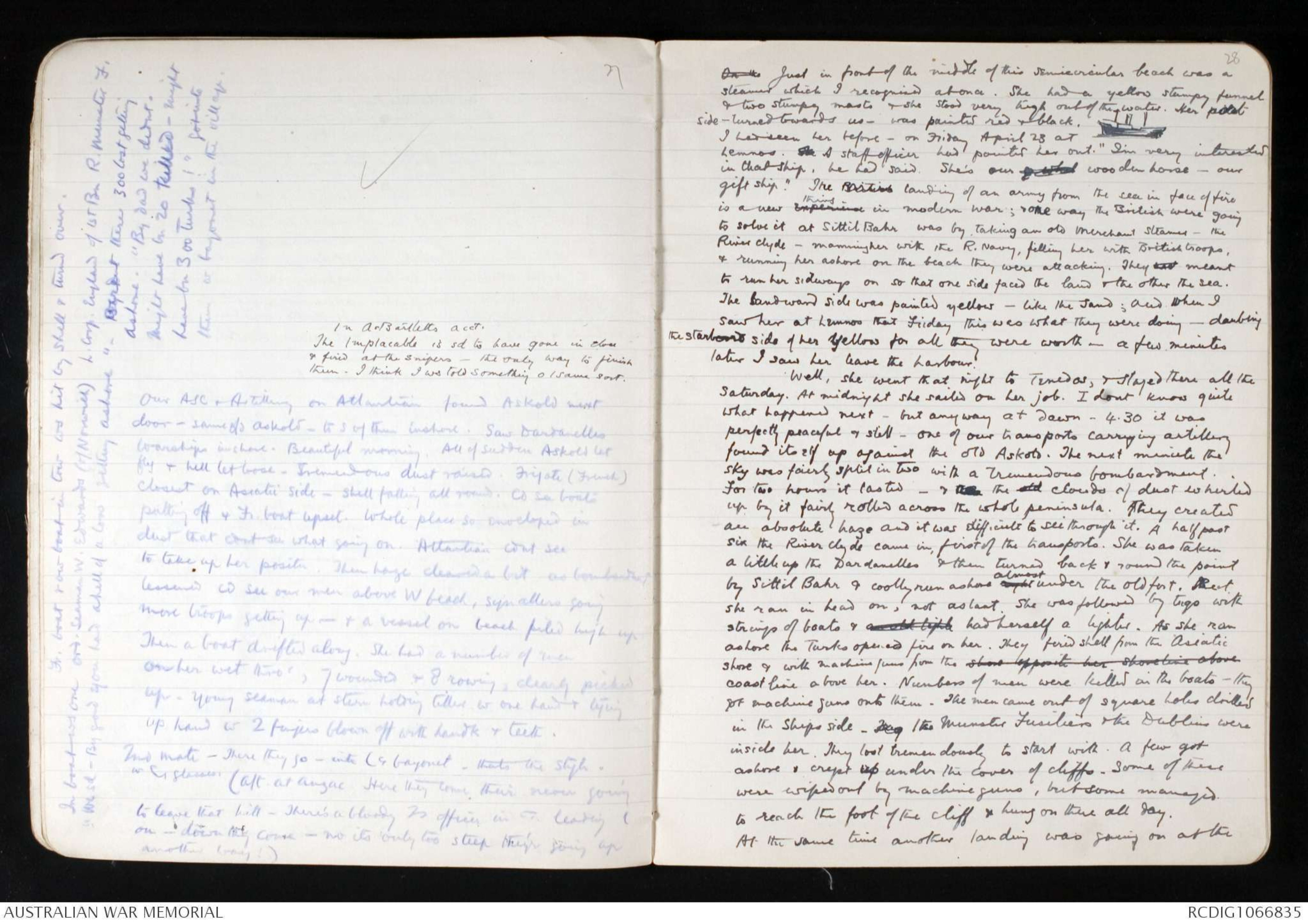
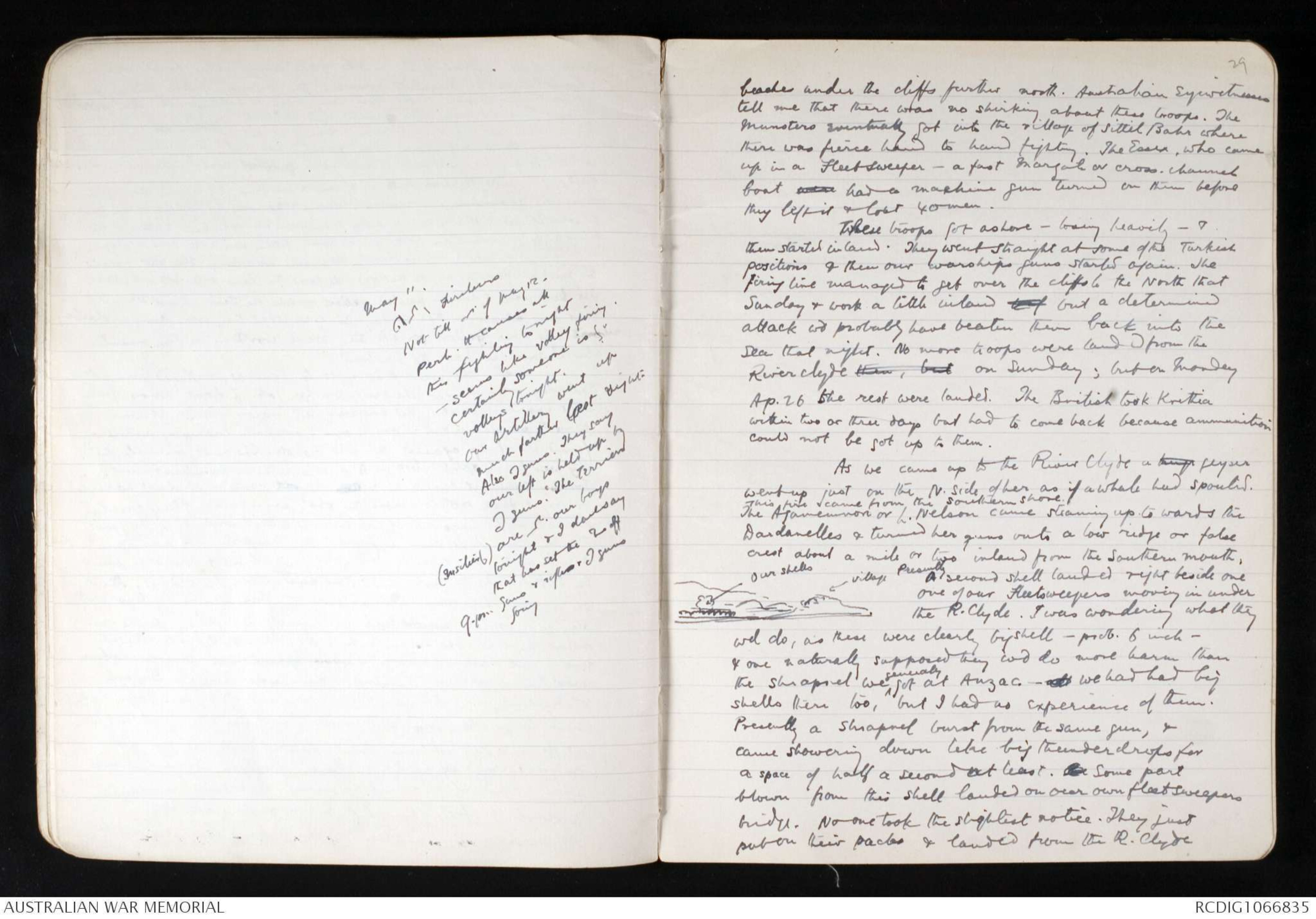
I have photos of Maj. Hughes No 2 gun - taken on its barrel. Also No 3 gun
broken wheel & I think firing at green field.
Maj. Phillips. No 3 gun ws the first of ours ashore - on Sunday evg.
Next day Hughes Battery. They were dragged up over scrub to right
- terrible job but had to be done & put right into firing line.
During 2nd or 3rd nights Turks got up & were found dead
with wire clippers within 10 yards of these guns. They used
to be hotted with rifle & m.g. fire [No 3 gun ws right in / line enfilading
the front of it [see fig opp.] but T. guns did not get onto them properly
for some days. They used to lay this gun on at night & have a
man sitting with his fhand on the firing lever all the time.
The infantry wd pass the word down when they wanted the
gun to fire & it wd be fired w fuse sometimes at zero as if it making it
were a a sort of shot gun. Had to be ^ most careful not to blow a hole in our own line
Enemy wd have got thro.
[It ws abt this time (May 3 or perh. 4) that Gen Bridges wanted
to have the Turk trenches opposite then growing opp. Bessell Brown (Later Lone Pine)
shot at. This cdn't be done without dragging gun into firing line, pulling
down sand bags, & firing point blank at abt 400yds. Col.Hobbs ws opposed to it.
Bridges forced him to try it. It ws done one day - the T.s not suspecting it let
it pass without punishment. The Gen. insisted on it being done again
next day. Col.Hobbs sd it wd mean the loss o / guns crew. Bridges
practically told him he ws afraid. Hobbs sd / men werent afraid & wd
do anything tt ws wanted of them - & it took place. The gun ws
dropped forwd, / sandbags taken down, / crew lay flat & 15 rounds
were fired under a tornado of fire & / gun run back. Not a man, I
believe was hit. This was prob. pure luck - the men were taking a
big risk.
One of Jopps guns at a little after this time ws in a casemate - looking
S.E. It had a window on S. slope of 400 near McNicolls old 11.9.
but its arc ws only abt 15 degrees & it ws eventually (abt May 20?) taken
out. We were not good at concealing our guns at first - in fact the
N.Z. guns are far more carefully concealed than ours to this day (June 15)]
Rough position of guns 1st Australian
June 15: Divn. 2 guns out.
4 guns at Helles.
Hand drawn diagram - see original
19
Sent back, with Maj. Sweetland. The 7th battery manned their guns
for 5 days continuously, from Monday to Friday. ^ Ap 30 On Friday they were
relieved by the men of the 9th under Maj. Burgess; They remained there till
Tues May 4th when Maj Hughes & the men of the 7th Battery went back again.
On the evg. of Sunday May 2 Maj. Bessell Brown got two guns
in action. They are in the firing line of the 2nd Brigade with the scrub
in front of them partially screening them. Maj. Hughes' 4 guns are in the
firing line of the 3rd Brigade - one gun right in amongst the Infantry.
They have been doing this shooting at 1000 yards or less. Sometimes their
fuses have been set at zero to burst at 50 yds or less at men rushing them at
night. They (& the infantry in front) think they have killed 1000 men. The
infantry now pass back a message any time they see Turks In thegullies collecting in the gullies at the foot of ^ Hill 400 & ask the guns to
get at them, & the guns do so at once. The two arms there certainly
understand each other wonderfully well. Rosenthal is now in the midst of
the 3rd Brigade & he has not the slightest fear of their giving. The only people
that make him nervous are the Royal Naval Division people in the centre.
Rosenthals guns are so placed as to have a remarkable look out
over Hill 400.
Hand drawn diagram - see original
Over the scrub is a green field known as Deadmans field on acct of
the large number of Turks killed there since the battle started. They have
dragged a lot away, but you can still see numbers lying there in the corn wheat which is getting higher daily. Beyond that are a
number of gullies leading up to 400 metre hill on which Turkish
trenches are thick. Whilst I was there we saw some Turks entrenching
on 400 & pumped 5 or 6 shrapnel into them : "Are those Turks entrenching
or our own men ? " Someone asked - shovel fulls of earth cd be seen,
like those a gravedigger throws over the edge of his pit. "The enemy clearly"
someone answered. "Give them one or two then" sd Maj. Hughes.
"Put your right finger in your ^ right ear" (The one nearest the gun) he sd to me.
But before we got onto the place the Turks ^ gun below us got one in on it. I saw the
flash right onto the trench & something - I dont know what - was
shot into the air.
Hand drawn diagram - see original
When I looked again there ws a spade or a rifle lying
20
on the outside of the xxx parapet.
On Tuesday morning ^ Ap. 27th at 3.30 this battery put 36 rounds
of shrapnel into 8 or 9 acres on Hill 400. The Turks were attacking
but they cleared out. Our infantry cd see them massing on
Contour 400 (where they fought on Monday afternoon) & on 3 successive
mornings shelled them out of it - ie. Tues. Wed. & Thurs. The only
way to get these close ranges ws to bring the guns into the trenches.
Otherwise they wd have had to fire over the crest & wd have been useless
at anything under 4000 yards. As it is they have laid out Turks not
more than 50 yds in front of the trench.
"It wd have done your heart good," sd Rosenthal, "to see
the way the infantry appreciated our firing. It was the one thing
they wanted - to hear their own guns."
I think the general was averse to having the guns up
for fear of losing them. He finally They were finally sent up on
condition that all proper safeguards were taken & that no risk
was to be run. Rosenthal simply ignored this caution. "Which
is better, to lose a couple of guns or to lose a battle?" he
asked - & ran the guns right in amongst the at himself infantry. They
have been hit all over. Wheels pierced, shields spattered; but I
believe they have only lost 7 men so far.
From Rosenthals position I got some good photos of the ^ right front of our
line & hill 400, & also Kaba Tepe. I ought really to register these or I shall
forget which is which. (Shrapnel bullets are spattering about within a few feet
of my dug out - the enemy has a 3rd gun firing, wherever it is.) The hills
towards K. Tepe are simply honeycombed with trenches & there are some
gruesome looking trenches running across & up & down the slopes of
Pasha Dagh across to valley. From a hill just on the right front of the
battery a trench goes all along its crest towards K. Tepe. You
can see on the next slope back two formidable positions one
something like this in the hill & just below
Hand drawn diagram - see original
& to the left of it an earth work with
what looks
like a concreted
back. In the valley
behind is a house with
a red roof where they saw the horsemen (8 or 10) yesterday;
& on the K. Tepe beach is any amt of wire running
round towards us & then zigzagging up from the beach
so as always to be on the fire crest, I suppose, from
the Turkish trenches.
Just over the hill from Rosenthal is a camp of
5 tents belonging to the Turks - but deserted. Our men
Hand drawn diagram - see original
21
got into it the first day & many got beyond. Last Wed. (Ap. 28.) Some
of the artillery officers went down & had a look at it. The tents are Bell
tents, something like ours but smaller. It was raining that night - so the
men pinched the Turkish overcoats which are quite good, & also brought
in some of their bread (rather sour) and bully beef. Their kits are good.
As our first officer walked into this camp he was nearly knocked down by
the sight of a man sitting or resting there in front of a tent. He had to
look twice before he saw that the man was dead. He said nothing &
watched each of the others get an electric shock as they too came in &
saw him.
The Beach to the S. is getting which I walked over a couple of days ago
for the first time is now one mass of stores - a really great depot.
Right away nearly a mile to the South of here come fodder
stacks for the mules - & any number of mules. Then big stacks
of biscuits. Then a hea scores on scores of little carts all painted
grey - of rather light work; then engineer stores of all kinds,
pontoons, stacks of timber like a saw yard, pipes. Then
the Hospital, then more stores; brounds of biscuits, more fodder,
cheeses, sacks of some stuff near the wireless station.
Lastly water.
To the South of our gully up a little gully of their own
are the Army Corps H.Q. They are very safely dug in. Our
own HQ is not so safe. It was built when K. Tepe was still a
nuisance & so is dug into the hill in a Southerly direction.
K. Tepe was finished with the 1st evg. by an 18 pdr shell. Since
then our old friend "Here we are again" on the folds of the 900 hill
to the N.E. has been visiting us regularly - generally abt
mealtime; & very nearly scored. He got ^ Maj. Foote on the shoulder
& Col. White in the stomach - Col. White was right in the dugout
having some bread & jam at lunch. He laughed as the damned
thing hit him.
Hand drawn diagram - see original
Every now & then as you walk along there is a
ceaseless plonk plonk of bullets flying over
into the water. A few reach the beach & are t. I have
22
seen one picked up there but the gradient is too steep for most.
Men have been killed there by them. There is always a dead
mule or 2 on beach. They simply tow them out into deep water.
A few life boats, one punt & a trawler are sunk either on the
beach or just off it. The trawler lies on her side now just
visible [Hand drawn diagram - see original] off the rest camp. Water is sunk for
at the bottom of the gullies. There is a terrible smell opposite
one of these wells & the notice : I must be boiled. Water brought from
the beach may be put into water bottles direct.
Have had no more of that howitzer to day - the one like
escaping steam without the burst that I cd hear as I wrote
yesterday. But we had the Goeben at 7.30. The range was
too long for her. The roads around camp are constantly being
improved. All spare bags go at once up to the firing line - they
took some from the dug out of my next door neighbour.
Snipers have now been cleared out of the gullies. Our
men got them with bayonets. Shooting within the lines is
dangerous although they sometimes do it. The sniper lies
low whilst you look search for him & wont generally shoot at
2 or 3 men armed bec. the others wd drop & search for him.
He simply lies low & is ^ genly bayoneted when found. They try &
cover themselves with leaves - one caught the other day ws
like a bit of moving scrub.
Lots of periscopes have now bn made - little bits
of looking glass one put at half a right angle - one wired into top
of a stick, other onto bottom. [Hand drawn diagram - see original] The bottom one faces upwards
You look into it & see the upper one & in it see reflected
whatever is above the trench.
Our balloon - a ^ British military one - goes up
every day from the Royal Ark outside. She looks like a great
yellow garden grub with a sort of extra sack at the bottom end,
tied by the tail [Hand drawn diagram - see original] to her ship. We used to wonder why she
moved abt so often & so often disappeared
came down. Mackworth has a brother
in her. It turns out that she has done
a lot of fine work. She spotted a brigade of
artillery out firing agst the British
last week. She put the Q. Eliz. on
to them. There was a tremendous
23
scatter of earth. When the dust blew away there was only a
litter on the ground which has remained there ever since.
The observer is inclined to think the whole brigade was wiped
out.
The other day (Wed. or Thurs). a rumour spread that we
had lost one of our planes. At any rate an aeroplane was
seen to go right over to the Dardanelles & then go down there
in the enemy's country. It was ^ really one of his aeroplanes. The
British have a O circle under their wings. I didnt see
this. but we know that It comes out after the balloon &
throws bombs at it. It has been near but has never yet hit
our balloon. One day the balloon when in close did get a
splinter of shell into her. One small gun tried to get her but
she steamed in & with a 12 pdr which the Ark Royal carries
managed to finish it in 10 shots. When our aeroplane
was out the other day, flying low a little cloud unfurled
itself on this side of her; then another on the further side.
The aeroplane at once turned to sea.
They think the Turks must have heard that we
intended to land at Kaba Tepe, for they made the place
exceedingly strong. I doubt if we cd have landed there.
The Balloon can see the Goeben lying over the other side.
I hear that Sir Ian Hamilton is going to take 2 of our brigades away
tonight to help the British push through. One is inclined to wonder
why he doesnt push through here. Still, I suppose Birdwood
must have been consulted. He's taking the 2nd Brigade & one other.
One cant help a natural disappointment in finding our show
turned into a side show. Ian Hamilon has taken Cox's Brigade.
He is taking these 2 brigades; & he will I suppose take the East
Lancs. Division as well. Perhaps they'll take our Light Horse too.
I hear a naval rumour that the Q.E. was hit in the bows
& the ship we see off here now is the Warspite. Someone Murphy did see on
Mond. or was it Wed. Ap. 28 a very big burst of foam agst the side
of the Q.E. as she steamed south. He was talking to me at the time.
I did not see it.
The first Sunday night. There ws distinctly some
question abt. our withdrawing. The City of Benaires had orders
to send in her boats (or keep them ready) to take us off; & a high
naval authority on the beach told Col. Giblin that he must
get his clearing hospital off as soon as possible.
24
We ^ now know we have 24 battns agst us - we have placed
them. We ourselves have 12 of ours, 4 (4th Bde) & 4 (NZ) - 20 from
Australasia; & 3 R.M.L.I. & Naval Bdes - I dont think "Nelson"
is here. That makes 23 of whom our Australasian troops are
good & the naval people feeble. The navy is quite different - it is
splendid, the best in the world. But these poor R.M.L.I. & Naval
Brigade lads seem very unfitted for hard fighting. Unfortunately
our own fine infantry of the 1st Australn Divn has lost 5000 men -
abt 40 p.c. of its strength. The Divn can only be 7000 strong at
present. We know the Turks too have lost heavily. Our missing
are probably lying out beyond our lines - one knows indeed
that many of them are. Ones natural wish is that they wd
give us our Light Horse, give us our reinforcements, & then let us
push through.
This afternoon (May 5th) I intended to go along with
Blamey to Major Rosenthal's battery again. However as
my diary was not finished & the afternoon seemed
quiet I decided to stay & finish it. Blamey went along &
sat near R.'s battery sketching K. Tepe, more for amusement
than anything. A couple of guns suddenly opened from K.T.
this afternoon, just over the crest, near the house. They had
to come near the crest to get the near range. Their smoke
was quite visible - indeed you cd see one gun. Rosenthal
got onto them & put one shot fair on to one of the guns. There
was a huge splash & afterwds one of the gun wheels was
lying on the side of the emplacement. The other gun was fairly
plastered with shell but Blamey doesnt think we hit it.
Meanwhile another gun - a bigger brute - prob. the one out in
the plain - was feeling for the beach. Murphy & I walked along
to a hill - Battery Hill at the S. end of the beach - where you
cd see him. He was getting into the water - & increasing abt
200 yds each shot - like a great flea in successive hops.
You cd see the foam of 3 shots at once in the sea - it lingered
quite a while. Finally I thought he ws trying for some infantry
or for the gun. But he finally came inland & plunked
shell after shell onto the hillside. Fully 25 per cent of his shell
failed to burst.
But I think it was he that got a shell into Rosenthals
25
dug out & laid him out & Maj. Hughes. Old Rosenthal was
hit in abt 6 places - a bullet in the knee - a hit on the back of the
head. He simply came down to the beach to have the wounds
dressed & went sd he wd go back agn tomorrow - quite
complacent. I dont think he will go back tomorrow all the
same.
8pm. The Turks appear to be attacking from the wild firing up the
hill. But you never know in this place. - the marine lot are upthere. They think that by keeping up that fire they can wear us
down, I believe; keep us awake. Our men fire very little now.
9. pm. I got leave to come off with the 2nd Brigade - & a N.Z. Brigade,
to reinforce at Cape Helles. We were to leave at 9.15 - go down by
night; the transfer wdnt be noticed by the enemy.
Thurs.April May 6th 1915 Well at long before 9.15 the first lot of troops were ready in
the boats - but no destroyers to take them off. We waited all
night. & about 2.30 in the morning at last the I waited with
the staff in Marsh's A.S.C. mess for a bit & then curled up
under some salt flour bags in my sleeping bag & slept on the
beach till 2.30. The first lot of boats was just moving off then
At 3.45, in plain daylight, we got onto were taken to a trawler from in a
horse lighter. They were very nice to us - let us leave our
kits in a cabin where I am writing this. The troops take 2
days rations. They had been very cold all night. The A.S.C. mules
which generally occupy the mules were sent away from
the beach by our staff in order to make room. Some
other staff officer - Egyptian "Beach officers" I think, taken
from the Egyptian service, sent them back. This happened
3 times ; 3 times the mules were sent up the road ; 3
times they were ordered back.
Altogether a rotten piece of staff work. The first
thing that happened when we got on the ligh trawler was
that her captain asked: "Does anyone know when we
sail? Who is to give us orders to sail?" We shall have
? Hooper
Hooper ^ (5 Bn) went out & ws digging a fort 150 yds in front o / line. He
had set up fairly deep but very narrow when / naval searchlight got on to him.
& maxim & mgs started at once. They had to come back, & lost one man.
Pte Thorburn on 1st day with 5th Bn got on to / further hill, & ws left
behind there ½ hr. The Bn lost heavily.
Half hr later Thorburn came up dragging
a wounded man.
Lusitania right out
Huge white super liner
3,300 [[shorthand]]
500 NZ from Alex
Turning
Deal Bn & Col Bendyshe: On Sat. night M'Nichol went up
& came upon / Deal Bn wh ws getting bombs He went w their Col. wh hadnt
bn in / trenchs yet (so McN. says) not always a first class witness) They went through,
talking to / men. He reached one lot & ws sitting talking to them when a man a few
paces away suddenly stood up. Bendyshe sd : sit down my man, you will get hit." He sd: All
right Sir," quite respectfully. But he didn't sit down. The next moment he raised his rifle & blazed
straight at M'N. He missed M'N & / next instant / who* trench ws in an uproar. From both
sides they were blazing away into these officers. They had spy mania. They shot Bendyshe
& / Sergt Major & wounded 2 privates & then came at M'N with bayonets. They tried
to stick him thro' / shoulder & then got / point of a bayonet into his back.
He warded off one, for his chest & had his hand cut. I hear they got him down,
blindfolded him & led him to / rear. They left their own Colonel there for 36
hours unburied (McN. says). They had bn in / trenches abt 24 hrs relieving the
6th Bn. They were taken out & set to sweeping roads.
(M'Ns account may be tinged by
some bitterness e.g. the last statement).
May 11th Hear that poor old Pte Warren - one of the three boys
who came with us to Luxor - was killed the first Sunday.
He was the one who said in the train coming back
from Luxor : that "It's funny - but I never have reckoned
I ws coming back from this business. I know I'm
going to be killed. - I always have thought so."
Poor old chap - Im afraid theres no doubt
of it. They say they have his disc & his paybook
- No-one knows how it happened that I have spoken to
26
[*The Navy looked after us splendidly
on this little trip - gave us warm tea straight away
& good breakfast later. (of P of W & Q.E.) They were
mostly R.N.R. men. They had had an
awful time in the N. Sea.*]
told the enemy that we have weakend here & strengthened
down S - a hopeless thing to do.
Altogether tonights arrangements are in keeping
with the worst days of the British service.
Down Past the coast - cant see a sign of life on it - not even a goat.
Navy gave us a warm breakfast - good warm soup & cocoa.
4.57. Opposite the French landing. A few tents on the brow of theafd cliff. Others under the bottom of it along the beach. A couple of horses
running on the cliff top. They dont seem to have much more of
a hold here than we have. (It wasn't the French landing
after all. The French after 1 day on the Southern shore came
back & landed on the English right at the Southernmost
beach). We steamed past a ruined signal stn - still used as
as a signal stn by us. It should had been heavily battered
- it stood on a cliff. The fleetsweeper on which we were - F.S.6.
(the Hythe, I think a small cross channel boat) swept in
quickly past a score of huge transports - they looked like
White Star & Cunard liners, & one seamed huge fourfunnelledst steamer looked to me like the Lusitania - but she
turned out to be La France - when you looked a second time
you saw her funnels were to squat & there was too much
slablike slab white upperwork on her sides. She was moving in. As
we came round the corner of the cliff the Southern shore
was full in view of us - where Troy or the mound on
which it stood. There was high ground near the shore southern
entrance of the Dardanelles but further in it was flat
with a village on it which, under the telescope, seemed to be battered.
Further up from the mouth it was a flat valley with several
hills or mounds in it ; & in the background rising to much
higher mountains - sullen leaden grey & a snow capped
ridge away to the S.E.
On the Shore round which we were steaming the
white cliff suddenly fell away. There was a fort - a low earth
work fort on the top of it - then it fell away to a beach.
On the South it rose again to a great ancient stone square stone
fort which you could hardly recognise as a fort; the white stones of
it were mostly standing - with huge gaps; but they seemed to
have been almost disintegrated by some mighty shaking. Behind it
was a village - It looked an ordinary village & I didnt
trouble to give it a further glance at the time. As a matter of
fact every house was, I believe, deserted & the place battered
to pieces.
27
[*Fr. boat row boat in tow ws hit by shell & turned over.
In boat ws one ord. seaman W. Edwards (of Norwich) L. Corp England of 1st Bn R. Munster F.
"We sd - By god you had a hell of a loss getting ashore" - By xxx theres 300 lost getting
ashore. "By dad we didnt -
Might have bn 20 killed - might
have bn 300 Turks!" Got into
them w bayonet in the village.*]
In A. Bartletts acct.
The Implacable is sd to have gone in close
& fired at the snipers - the only way to finish
them. I think I ws told something o / same sort.
Our ASC & Artillery on Atlantian found Askold next
door - same old Askold - to S of them inshore. Saw Dardanelles
warships inshore. Beautiful morning. All of sudden Askold let
fly & hell let loose. Tremendous dust raised. Frigate (French)
closest on Asiatic side - shell falling all round. Cd see boats
putting off & Fr boat upset. Whole place so enveloped in
dust that cdnt see what going on. Atlantian cdnt see
to take up her position. Then haze cleared a bit as bombardment
lessened cd see our men above W beach, signallers going
more troops getting up - & a vessel on beach piled high up
Then a boat drifted along. She had a number of men
on her wet thro', 7 wounded & 8 rowing, clearly picked
up - young seaman at stern holding tiller w one hand & tying
up hand w 2 fingers blown off with handk & teeth.
2nd mate - There they go - into them with the bayonet - thats the style.
w field glasses (Aft. at Anzac Here they come, their never going
to leave that hill - There's a bloody German officer in [[shorthand]] leading them
on - down they come - no its only too steep they're going up
another way!)
28On the Just in front of the middle of this semicircular beach was a
steamer which I recognised at once. She had a yellow stumpy funnel
& two stumpy masts & she stood very high out of the water. Her port
side - turned towards us - was painted red & black. [Hand drawn diagram - see original]
I had seen her before - on Friday April 23 at
Lemnos. The A staff officer had pointed her out. "I'm very interested
in that ship, he had said. She's our of what wooden horse - our
gift ship." The British landing of an army from the sea in face of fire
is a new experience thing in modern war; & one way the British were going
to solve it at Sittil Bahr was by taking an old merchant steamer - the
River Clyde - manning her with the R. Navy, filling her with British troops,
& running her ashore on the beach they were attacking. They and meant
to run her sideways on so that one side faced the land & the other the sea.
The landward side was painted yellow - like the sand; and when I
saw her at Lemnos that Friday this was what they were going - daubing
the starboard side of her yellow for all they were worth - a few minutes
later I saw her leave the harbour.
Well, she went that night to Tenedos, & stayed there all the
Saturday. At midnight she sailed on her job. I dont know quite
what happened next - but anyway at dawn - 4.30 it was
perfectly peaceful & still - one of our transports carrying artillery
found itself up against the old Askold. The next minute the
sky was fairly split in two with a tremendous bombardment.
For two hours it lasted - & then the old clouds of dust whirled
up by it fairly rolled across the whole peninsula. They created
an absolute haze and it was difficult to see through it. A half past
six the River Clyde came in, first of the transports. She was taken
a little up the Dardanelles & then turned back & round the point
by Sittil Bahr & coolly run ashore right almost under the old fort. But
she ran in head on, not aslant. She was followed by tugs with
strings of boats & an old lighte had herself a lighter. As she ran
ashore the Turks opened fire on her. They fired shell from the Asiatic
shore & with machine guns from the shore opposite her shoreline above
coast line above her. Numbers of men were killed in the boats - they
got machine guns onto them. The men came out of square holes drilled
in the ships side - Feg the Munster Fusiliers & the Dublins were
inside her. They lost tremendously to start with. A few got
ashore & crept up under the cover of the cliffs. Some of these
were wiped out by machine guns, but some managed
to reach the foot of the cliff & hung on there all day.
At the same time another landing was going on at the
May 11.
[[shorthand]] relieved by Fusiliers
Not till morning of May 12.
Perh. tt causes all
this fighting tonight
- seems like volley firing.
Certainly someone is firing
volleys tonight.
Our Artillery went up
much farther last night.
Also machine guns. They say
our left is held up by
machine guns. 'The Terriers
(Fusiliers) are relieving our boys
tonight & I daresay
that has set the Turks off
9 p.m. Guns & Rifles & machine guns going
29
beaches under the cliffs further north. Australian eyewitnesses
tell me that there was no shirking about these troops. The
Munsters eventually got into the village of Sittil Bahr where
there was fierce hand to hand fighting. The Essex, who came
up in a Fleetsweeper - a fast Margate or cross-channel
boat were had a machine gun turned on them before
they left it & lost 40 men.
These troops got ashore - losing heavily - &
then started inland. They went straight at some of the Turkish
positions & then our warships guns started again. The
firing line managed to get over the cliffs to the North that
Sunday & work a little inland bef but a determined
attack wd probably have beaten them back into the
sea that night. No more troops were landed from the
River Clyde then, but on Sunday; but on Monday
Ap. 26 the rest were landed. The British took Krithia
within two or three days but had to come back because ammunition
could not be got up to them.
As we came up to the River Clyde a huge geyser
went up just on the N. side of her as if a whale had spouted.
This fire came from the southern shore.
The Agamemnon or L. Nelson came steaming up towards the
Dardanelles & turned her guns onto a low ridge or false
crest about a mile or two inland from the Southern mouth,
[Hand drawn diagram - see original]
Presently, A second shell landed right beside one
one of our Fleetsweepers moving in under
the R. Clyde. I was wondering what they
wd do, as these were clearly big shell - prob. 6 inch -
& one naturally supposed they wd do more harm than
the shrapnel we ^ generally got at Anzac - all we had had big
shells there too, but I had no experience of them.
Presently a shrapnel burst from the same gun, &
came showering down like big thunder drops for
a space of half a second at least. One Some part
blown from this shell landed on our own fleetsweepers
bridge. No one took the slightest notice. They just
put on their packs & landed from the R. Clyde
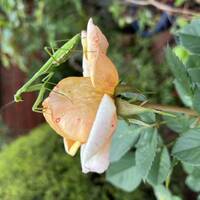 Daphne
DaphneThis transcription item is now locked to you for editing. To release the lock either Save your changes or Cancel.
This lock will be automatically released after 60 minutes of inactivity.